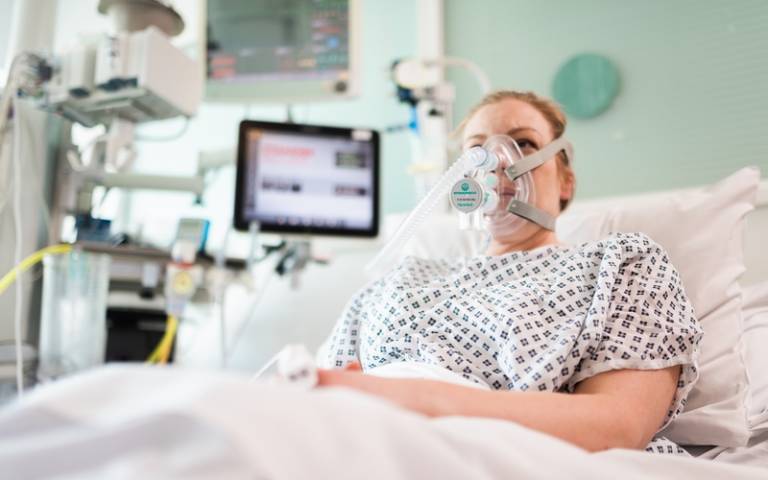Designs for breathing device developed at UCL made available worldwide
UCL healthcare engineers developed a new breathing aid in collaboration with UCLH clinicians and Mercedes (Formula 1 team) to support the global response to Covid-19.

8 October 2020
A volunteer ‘patient’ with UCL-Ventura, the newly developed CPAP device
Photo credit: James Tye/UCL
The designs of a new breathing aid developed by engineers at UCL and Formula 1 working with clinicians at University College London Hospital (UCLH) were made freely available to support the global response to Covid-19.
Continuous Positive Airway Pressure (CPAP) machines are routinely used by the NHS to support patients in hospital or at home with breathing difficulties. They work by pushing an air-oxygen mix into the mouth and nose at a continuous pressure, keeping airways open and increasing the amount of oxygen entering the bloodstream.
CPAP devices were used extensively in hospitals in Italy and China to help COVID-19 patients with serious respiratory problems to breathe more easily when oxygen via a face mask alone was insufficient.
However, during the initial months of the pandemic, the devices were in short supply in UK hospitals. To counter the shortage, engineers at UCL worked around the clock with clinicians at UCLH and Mercedes-AMG High Performance Powertrains (Formula 1) to develop a CPAP device that could be manufactured and delivered to NHS hospitals, ahead of any surges in hospital admissions due to the Covid-19 pandemic.
““Our focus from the beginning was to get these devices to the NHS frontline when they were needed.”
It took fewer than 100 hours from the initial meeting to production of the first UCL Ventura breathing device. Thousands of devices were then rapidly manufactured to meet demand from UK hospitals. Initial findings showed approximately 50% of patients treated with CPAP do not progress to needing invasive ventilation. More than 115 NHS hospitals are now using The UCL Ventura devices.
UCL also made the designs and instructions required to manufacture the device freely available online in April 2020 for manufacturers, governments and non-profit organisations across the world to download. Within two days, nearly 700 requests from 25 countries to access the information had been approved. Within five months of the design's release, they had been accessed by over 1950 teams across 105 countries. Over 20 of these countries had successfully moved to volume manufacture and submission of in-country regulatory approvals for use in their own healthcare systems.
“Our focus from the beginning was to get these devices to the NHS frontline when they were needed,” says Professor Rebecca Shipley, Director of the UCL Institute of Healthcare Engineering. “We hope that, by making the blueprints publicly available, they can be used to improve the resilience of healthcare systems preparing for the Covid-19 pandemic globally.”
 Close
Close


